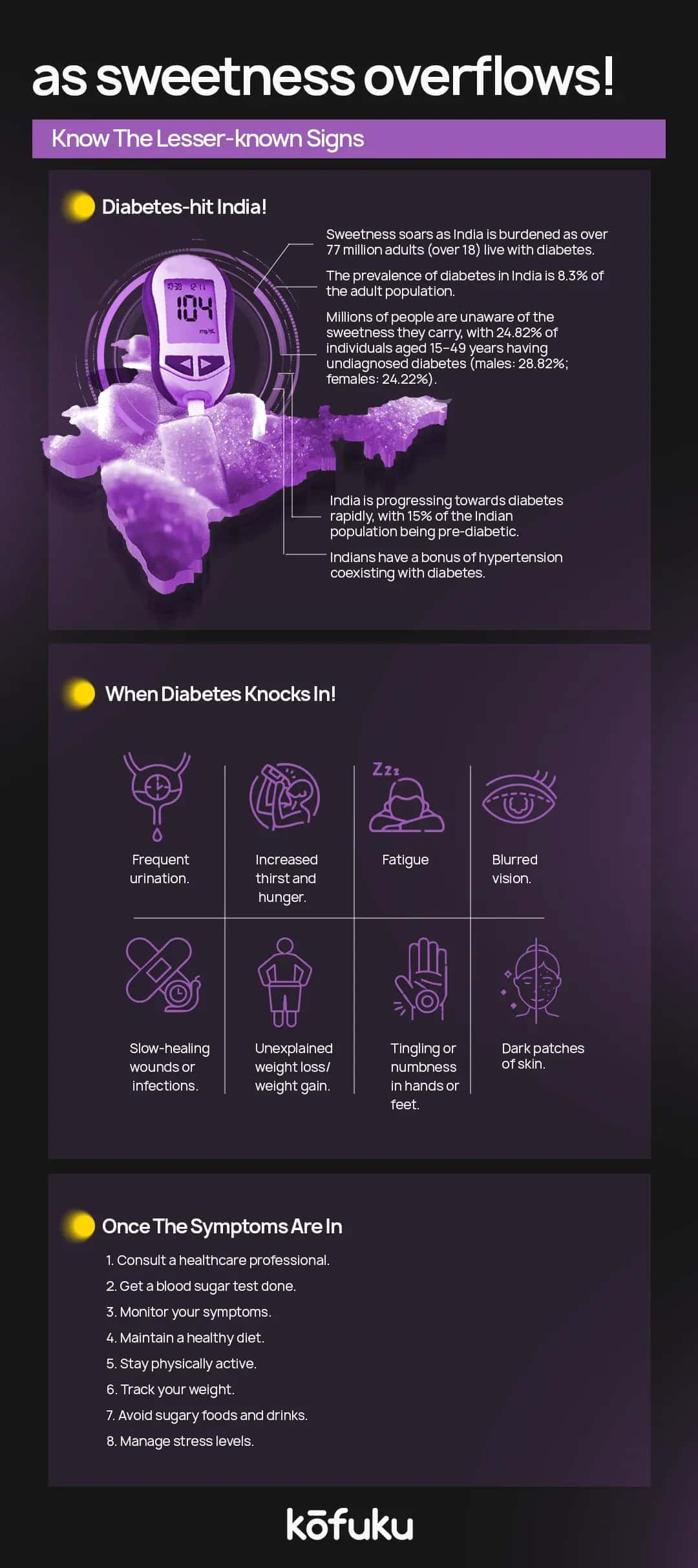12 Unusual Symptoms of Diabetes


Introduction
Diabetes is a complex disease. No matter how we look at it, managing diabetes requires attention and a lot of resources. You can’t just go like “I am diabetic, here’s what I should or should not do”. It’s much deeper than that.
Diabetes involves a commitment to monitoring your health and making specific lifestyle adjustments. While there are some common symptoms like increased thirst, frequent urination and fatigue, diabetes can present itself in many other, less apparent ways.
Some unusual symptoms often go unnoticed, making it harder to detect the condition in its early stages. From unexplained weight loss to tingling sensations in the hands and feet, diabetes can manifest in ways that are not immediately linked to the disease. Recognising such subtle signs is important for early intervention and effective management.
This blog will explore 12 of the lesser-known symptoms of diabetes, highlighting the importance of staying vigilant and informed about how this disease can impact your body unexpectedly.
Unexpected Loss of Weight
Unexpected weight loss, even though one might eat normally or even more, can be a signal of diabetes. When your body can’t effectively use glucose for energy because of a lack of insulin or insulin resistance, it begins to break down muscle and fat for fuel.
Because of this, weight loss happens, which can occur even if your caloric intake remains constant. The body starts to starve for energy, despite the abundance of food, making weight loss one of the most important warning signs of undiagnosed or poorly controlled diabetes.
Blurred Vision
Blurred vision is a lesser-known symptom of diabetes. Increased blood sugar levels can result in fluid shirting in and out of the lenses of the eyes, changing their shape and impacting focus. This can result in blurry vision.
Over time, high blood sugar can also ruin the blood vessels in the retina, potentially resulting in diabetic retinopathy, which can further impair vision.
The effect on eyesight can fluctuate, with improvements or deterioration, whichever way you look at it, depending on blood sugar levels. Immediate attention to blood sugar control can help prevent further vision complications.
Tingling or Numbness in Hands and Feet
Nerve damage or neuropathy is a well-known complication that results in tingling or numbness, especially in the extremities.
Prolonged high blood sugar levels can result in nerve damage, resulting in sensations like “pins and needles” or even complete loss of feeling.
This symptom is fairly common in people who have had diabetes for a while, but it can crop up earlier in some people if management of blood sugar is poor. Early detection and blood sugar control are important to prevent this nerve damage.
Slow Healing Wounds
Diabetes can massively impact the ability of the body to heal wounds. High blood sugar levels can impact circulation and immune function, making it tougher for the body to combat infections and repair damaged tissues.
This implies that cuts, bruises or scrapes might take much longer to heal, compared to someone who doesn’t have diabetes. In certain cases, even small injuries can result in major complications like ulcers or infections, especially in the feet.
Regular blood sugar monitoring and proper wound care are important so these issues don’t occur again.

Frequent Infections
Frequent infections, particularly in the skin, gums or urinary tract, can be a sign of diabetes. Elevated blood sugar ruins the immune system, making it tougher for the body to fight off infections.
These might linger longer or recur more frequently in people with poorly-controlled diabetes. Common areas impacted include the urinary tract, skin and respiratory system. Yeast infections are also quite common, especially in women.
Managing blood sugar levels and ensuring good hygiene are important for bringing down the risk of infections for people suffering from diabetes.
Dry Skin
Dry mouth and skin can be another uncommon symptom of diabetes, resulting from dehydration due to frequent urination.
Because of high blood sugar levels, kidneys filter excess glucose, which pulls fluid from tissues and can result in excessive thirst and dry mouth. Also, the lack of moisture in the skin thanks to fluid loss can result in dryness, itching or flaking.
With uncontrolled diabetes, such symptoms get worse, and while it might seem minor, it can be a sign of significant issues like dehydration or nerve damage, if left unaddressed.
Dark Patches of Skin
This condition, known as acanthosis nigricans results in dark, thick patches of skin to develop in areas like the neck, groin or armpits. These patches might feel velvety and are often a sign of insulin resistance, where the body struggles to use insulin properly.
The excess insulin in the bloodstream can stimulate skin cells to grow abnormally, resulting in the development of such darkened patches.
Acanthosis nigricans is mostly prevalent among Type 2 diabetics and can be an early warning sign of the disease, especially when paired with other symptoms like obesity and high blood sugar.
Increased Hunger a.k.a Polyphagia
Imagine feeling hungry, eating, and still not being satiated. Increased hunger or polyphagia can happen when diabetes is poorly managed.
Even though they eat, people with diabetes might feel constantly hungry because their bodies can’t efficiently process glucose for energy. Insulin or insufficient insulin production means the cells don’t get the glucose they need.
Because of this, the body sends hunger signals in an attempt to get more energy. This constant hunger, together with weight loss, can be a key symptom, especially when it crops up alongside other typical signs of diabetes, like frequent urination and excessive thirst.

Lightheadedness
For a lot of people, feeling lightheaded is usually attributed to fatigue or hunger, which can be true; this can also happen with diabetes, and not only with low blood sugar.
High blood sugar can result in dizziness as well. High glucose levels can trigger frequent urination, resulting in dehydration. And a low level of water in your body dictates how well your brain functions. Dehydration can also impact concentration and memory.
Fruity Smelling Breath
If your breath smells like fruit, then you might be diabetic. Fruity-smelling breath is another lesser-known symptom of diabetes, or more specifically, diabetic ketoacidosis.
When your body is not able to use insulin for energy, it breaks down your fat cells for the same. This process produces an acid called ketones. Excess ketones in the bloodstream normally exit the body through urine.
Even then, when the body begins to break down fat for energy, the impact is fruity-smelling breath, or breath that smells like acetone, or nail polish. Diabetic ketoacidosis is a severe complication of diabetes, and if you think you have it, seek medical attention immediately.
Pain in the Limbs
When high blood sugar levels persist over time, they can damage the nerves, resulting in a condition called diabetic neuropathy.
This nerve damage most frequently impacts the peripheral nerves, particularly in the legs and feet, resulting in symptoms like sharp, stabbing pain, cramps, burning sensations, tingling or even total numbness.
These sensations can range from mild discomfort to severe, chronic pain that can impact sleep and daily activities. Muscle weakness or loss of balance might accompany neuropathy.
Left untreated, it can get worse over time, increasing the risk of injuries, infections or even amputations thanks to unnoticed wounds or ulcers.
Dry Mouth
Dry mouth, also known as xerostomia, can impact anyone, but it is particularly common in people with diabetes. High blood sugar levels can reduce saliva production, leaving the mouth feeling dry and uncomfortable.
Saliva plays an important role in neutralising acids and washing away food particles, so too little saliva can increase the risk of tooth decay, oral infections and gum disease. Interestingly, dry mouth can stay after diabetes is diagnosed and treated.
That is because certain diabetes medications cause dry mouth as a side effect.
Nausea and Vomiting
Nausea and vomiting can often be overlooked signs of diabetes, often linked to a condition known as gastroparesis, which occurs as a result of diabetic neuropathy.
In this condition, prolonged high blood sugar levels damage the vagus nerve, which controls the movement of food through the digestive tract.
When this nerve is impaired, stomach muscles can’t contract properly, resulting in delayed emptying of food into the intestines.
Thanks to this, food sits in the stomach for way longer than usual, resulting in nausea, bloating, and even vomiting. This digestive disruption impacts blood sugar control, making it tougher to manage diabetes effectively in the absence of proper treatment.
Conclusion
A multi-faceted disease that can impact the body in many subtle and surprising ways, diabetes has many lesser-known symptoms, ranging from fruity breath to chronic dry mouth or tingling limbs, which can be key to early detection and better management.
Often brushed aside as everyday discomforts, such signs could indicate underlying issues related to blood sugar imbalance. Staying informed and vigilant is the best recourse, so seek timely medical advice.
Don’t allow complications to take place. When it comes to diabetes, no symptom is too small to ignore. Awareness and prompt action are your best recourse.
FAQs
Q. Can unusual symptoms appear before a diabetes diagnosis?
A. Yes, many of the unusual symptoms — like unexplained weight loss, tingling in the hands or feet, or frequent infections — can appear.
Q. Are these unusual symptoms the same for both Type 1 and Type 2 diabetes?
A. Some symptoms, like dry mouth, blurred vision, and neuropathy, can occur in both types. However, Type 1 diabetes tends to develop quickly and may show symptoms more suddenly, while Type 2 develops gradually, making subtle signs easier to overlook.
Q. Why does diabetes cause symptoms like dry mouth or fruity-smelling breath?
A. High blood sugar affects many body functions. It reduces saliva production, leading to dry mouth, and triggers the breakdown of fat for energy, which releases ketones, causing a fruity or acetone-like breath smell.
Q. Can managing blood sugar levels reduce or eliminate these unusual symptoms?
A. In many cases, yes. Controlling blood sugar through diet, exercise, and medication can improve circulation, nerve function, hydration, and immune response, potentially reversing or reducing the severity of unusual symptoms.
Q. Should I be concerned if I only have one of these symptoms?
A. While one symptom alone doesn’t confirm diabetes, it’s important to monitor your health. If a symptom persists or occurs alongside other changes like fatigue or increased thirst, consult a healthcare provider.





